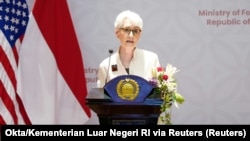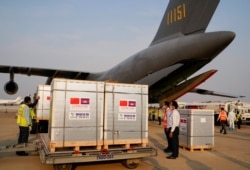PHNOM PENH, CAMBODIA — Foreign policy experts said senior State Department official Wendy Sherman’s visit to Phnom Penh was in anticipation of Cambodia’s chance to chair ASEAN next year and likely the Biden Administration’s attempt at engaging with the region.
U.S. Deputy Secretary of State Wendy R. Sherman this week will be the first senior U.S. diplomat official from President Joe Biden’s government to visit Southeast Asia, making stops in Indonesia, Cambodia, and Thailand.
“In Phnom Penh, the Deputy Secretary will hold a series of meetings,” reads a State Department media release about Sherman’s visit to Phnom Penh. More details are provided for her interactions in other countries.
Cambodian Foreign Ministry Spokesperson Koy Kuong said Sherman is scheduled to meet Prime Minister Hun Sen and Foreign Minister Prak Sokhonn when she arrives in Phnom Penh on June 1.
“I do not have detailed information on the agendas, but the discussion will mainly focus on bilateral issues … they can also exchange information on a number of areas,” Koy Kuong told VOA Khmer.
Koy Kuong did not provide details of the meeting and issues on the agenda, but suggested that “relations were good” and “nothing had changed” in the two country’s bilateral relationship.
“On the aspects of democracy and human rights in Cambodia, we are committed to constantly making improvements,” said Koy Kuong.
John D. Ciorciari, an associate professor at the University of Michigan, said a visit by the senior State Department staffer could be motivated by strong Chinese influence in the country.
“The Biden administration aims to reinvigorate ASEAN, and repairing relations with Phnom Penh makes sense, as Cambodia is next year’s ASEAN chair,” Ciorciari said in an email.
Cambodia’s relations with the U.S. turned sour after the former accused the western democracy of conspiring with an opposition party to topple the government. The U.S. has increasingly raised allegations that Ream Naval Base in the south of the country was being equipped for a Chinese military presence.
“It seems likely that Phnom Penh is included in the itinerary because of serious U.S. concern about the Chinese military presence at Ream Naval Base,” said Gregory Poling, senior fellow at the Center for Strategic and International Studies.
Both Phnom Penh and Beijing have denied the speculation of a possible Chinese military presence in Cambodia. At the same time, China has become a significant export destination for Cambodian agriculture products and a big infrastructure investor in the Southeast Asian country.
Prime Minister Hun Sen last week made very clear that China was probably the country’s closest ally, during remarks he gave at the Nikkei’s International Conference on the Future of Asia last week.
He dared critics to suggest alternatives to China’s investment and aid, and for alternatives to a steady supply of Chinese COVID-19 vaccines, which were aiding a quick vaccination program in Cambodia.
“The U.S. has carrots to offer Cambodia, including vaccine access directly and through the Quad initiative, but that won’t be delivered in any numbers until the fall at the earliest,” Poling said.
“That certainly puts the U.S. in a bind as Cambodia is in desperate need of vaccines now to confront the growing wave of infections in the country, and China is very publicly delivering vaccines while the US and the Quad still are not.”
According to some analysts, the U.S. fears that Cambodia’s over reliance on China could impact its leadership over ASEAN next year, including finalization of the South China Sea Code of Conducts.
“Sherman and her colleagues no doubt recall the fiasco when Cambodia last chaired ASEAN in 2012, blocking the foreign ministers’ communique in an apparent favor to Beijing,” said John D. Ciorciari of the University of Michigan.
“That points to the second reason for her visit: an effort by the Biden administration to stop or even reverse Cambodia’s slide into a closer embrace of China.”
W. Patrick Murphy, the U.S. Ambassador to Cambodia, has also talked about Cambodia’s turn to chair ASEAN next year. In an Op-Ed piece published by the Washington-based Stimson Center, Murphy mentioned the failure to produce a joint ASEAN communiqué in 2012.
“The stakes are higher than ever now: in the intervening decade the PRC [People’s Republic of China] has increased its reclamation, construction, and militarization of disputed features in the region,” Murphy wrote.
Sherman is also urged to address Cambodian government’s crackdown on dissidents during her visit.
The University of Michigan’s John D. Ciorciari said issues related to China could be on Sherman’s agenda in Phnom Penh though she could also criticize the failing human rights situation in the country.
“U.S. policy towards Cambodia,” he wrote in an email, “reflects two competing impulses—pressing for democracy or accommodating Hun Sen to curb Chinese influence. Sherman’s visit suggests that the latter impulse may now be ascendant.”
In the last 18 months, the United States had become a major destination for Cambodian exports, including travel goods, garments and other products. Cambodia enjoyed a significant surplus of some $6.2 billion in trade with the U.S. last year. This is also seen as a potential agenda for Sherman’s talk with Phnom Penh.
There have been some calls from U.S. Congresspersons to tie Cambodia’s democratic backslide to access to the Generalised Scheme of Preferences, after the European Union imposed tariffs on 20 percent of Cambodian exports in 2020 for long-standing human rights violations.
Heimkhemra Suy, an independent development advisor, said in an opinion piece published on The Diplomat that the U.S. should use its position as an export destination cautiously, if it didn’t want Cambodia to further embrace China’s economic largesse.
“The nature of Cambodia’s exports suggests that China cannot replace the U.S.: While the U.S. is a consumer of Cambodian products, Cambodia is China’s consumer. This makes America a better trade partner over the long run,” he wrote.
“In this light, the U.S. should present the GSP as an opportunity rather than a threat and use it as the foundation for a renewal of the American presence in Cambodia.”






